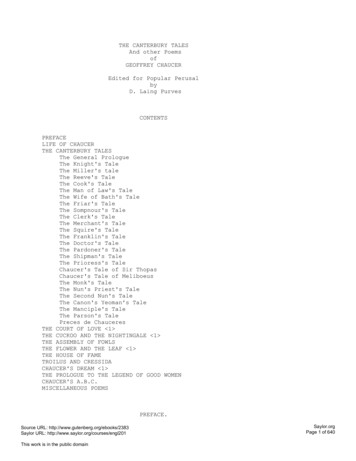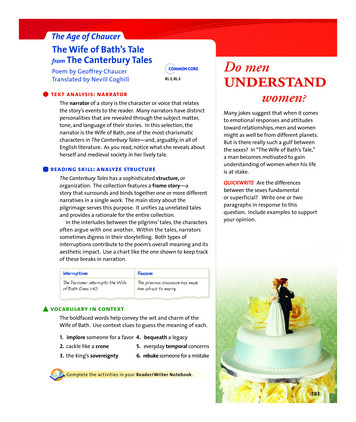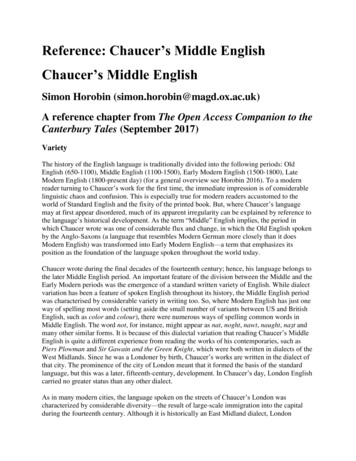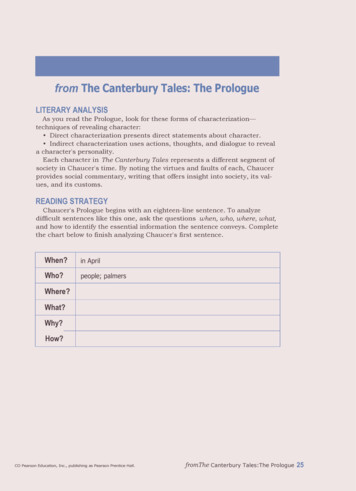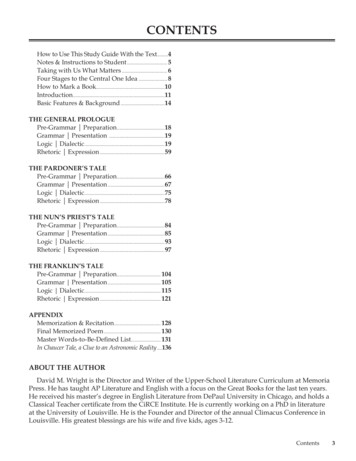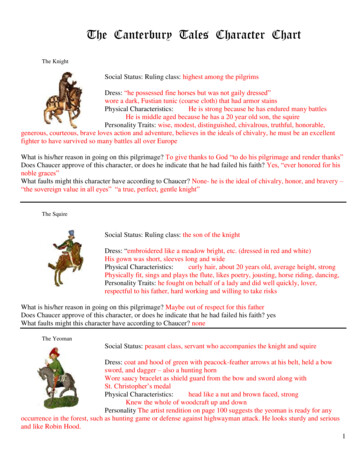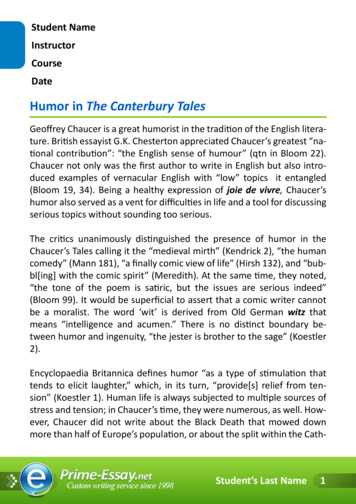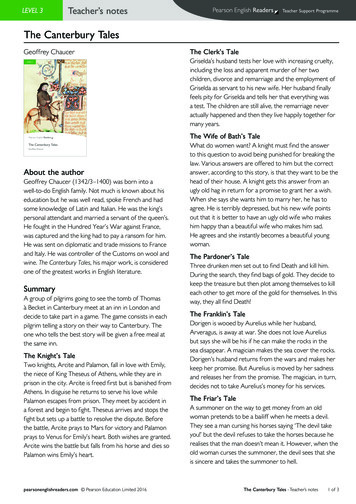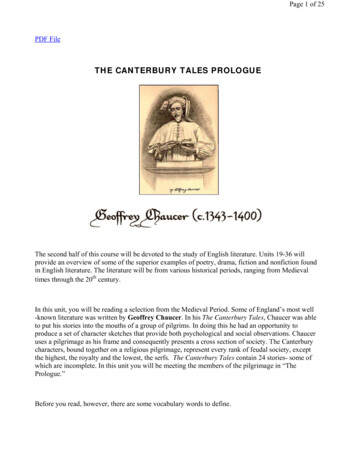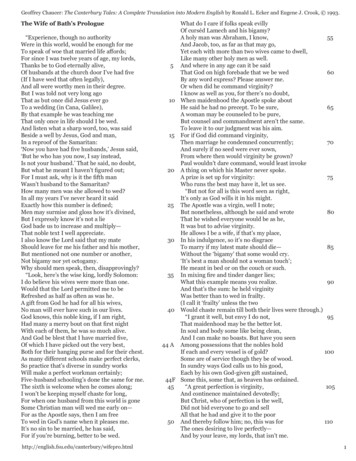
Transcription
Geoffrey Chaucer: The Canterbury Tales: A Complete Translation into Modern English by Ronald L. Ecker and Eugene J. Crook, 1993.The Wife of Bath’s Prologue“Experience, though no authorityWere in this world, would be enough for meTo speak of woe that married life affords;For since I was twelve years of age, my lords,Thanks be to God eternally alive,Of husbands at the church door I’ve had five(If I have wed that often legally),And all were worthy men in their degree.But I was told not very long agoThat as but once did Jesus ever goTo a wedding (in Cana, Galilee),By that example he was teaching meThat only once in life should I be wed.And listen what a sharp word, too, was saidBeside a well by Jesus, God and man,In a reproof of the Samaritan:‘Now you have had five husbands,’ Jesus said,‘But he who has you now, I say instead,Is not your husband.’ That he said, no doubt,But what he meant I haven’t figured out;For I must ask, why is it the fifth manWasn’t husband to the Samaritan?How many men was she allowed to wed?In all my years I’ve never heard it saidExactly how this number is defined;Men may surmise and gloss how it’s divined,But I expressly know it’s not a lieGod bade us to increase and multiply—That noble text I well appreciate.I also know the Lord said that my mateShould leave for me his father and his mother,But mentioned not one number or another,Not bigamy nor yet octogamy.Why should men speak, then, disapprovingly?“Look, here’s the wise king, lordly Solomon:I do believe his wives were more than one.Would that the Lord permitted me to beRefreshed as half as often as was he.A gift from God he had for all his wives,No man will ever have such in our lives.God knows, this noble king, if I am right,Had many a merry bout on that first nightWith each of them, he was so much alive.And God be blest that I have married five,Of which I have picked out the very best,Both for their hanging purse and for their chest.As many different schools make perfect clerks,So practice that’s diverse in sundry worksWill make a perfect workman certainly;Five-husband schooling’s done the same for me.The sixth is welcome when he comes along;I won’t be keeping myself chaste for long,For when one husband from this world is goneSome Christian man will wed me early on—For as the Apostle says, then I am freeTo wed in God’s name when it pleases me.It’s no sin to be married, he has said,For if you’re burning, better to be What do I care if folks speak evillyOf curséd Lamech and his bigamy?A holy man was Abraham, I know,55And Jacob, too, as far as that may go,Yet each with more than two wives came to dwell,Like many other holy men as well.5 And where in any age can it be saidThat God on high forebade that we be wed60By any word express? Please answer me.Or when did he command virginity?I know as well as you, for there’s no doubt,10 When maidenhood the Apostle spoke aboutHe said he had no precept. To be sure,65A woman may be counseled to be pure,But counsel and commandment aren’t the same.To leave it to our judgment was his aim.15 For if God did command virginity,Then marriage he condemned concurrently;70And surely if no seed were ever sown,From where then would virginity be grown?Paul wouldn’t dare command, would least invoke20 A thing on which his Master never spoke.A prize is set up for virginity:75Who runs the best may have it, let us see.“But not for all is this word seen as right,It’s only as God wills it in his might.25 The Apostle was a virgin, well I note;But nonetheless, although he said and wrote80That he wished everyone would be as he,It was but to advise virginity.He allows I be a wife, if that’s my place,30 In his indulgence, so it’s no disgraceTo marry if my latest mate should die—85Without the ‘bigamy’ that some would cry.‘It’s best a man should not a woman touch’;He meant in bed or on the couch or such.35 In mixing fire and tinder danger lies;What this example means you realize.90And that’s the sum: he held virginityWas better than to wed in frailty.(I call it ‘frailty’ unless the two40 Would chaste remain till both their lives were through.)“I grant it well, but envy I do not,95That maidenhood may be the better lot.In soul and body some like being clean,And I can make no boasts. But have you seen44 A Among possessions that the nobles holdIf each and every vessel is of gold?100Some are of service though they be of wood.In sundry ways God calls us to his good,Each by his own God-given gift sustained,44F Some this, some that, as heaven has ordained.45“A great perfection is virginity,105And continence maintained devotedly;But Christ, who of perfection is the well,Did not bid everyone to go and sellAll that he had and give it to the poor50 And thereby follow him; no, this was for110The ones desiring to live perfectly—And by your leave, my lords, that isn’t me.1
Geoffrey Chaucer: The Canterbury Tales: A Complete Translation into Modern English by Ronald L. Ecker and Eugene J. Crook, 1993.For I’ll bestow the flower of my lifeIn all the acts and fruits of being wife.“And tell me for what reason, if you can,Were organs made for reproducing manWho’s made in such a wise and perfect way?They were not made for nothing, safe to say.Gloss over whoso will, tell all creationOur little things both are for urination,And that they’re made so different in detailSo we can know the female from the maleAnd for no other reason—you say ‘No’?Experience knows well it isn’t so.That learned men I not provoke to oath,I mean to say that they were made for both—That is, both for relief and for our easeTo procreate, so God we not displease.Why else should men into their ledgers setThat every man yield to his wife her debt?And how can he pay this emolumentUnless he use his simple instrument?That’s why upon all creatures these are set,To urinate and also to beget.“But I don’t say that everyone possessingEquipment such as this as I was stressingMust go and use it for engendering,Lest chastity be held a worthless thing.Christ was a virgin though shaped as a man,And many a saint since this world first beganHas also lived in perfect chastity.I don’t begrudge them their virginity;They’re bread from finest wheat, so be it said,And let us wives be known as barley bread.And yet with barley bread, as Mark can tell,Was many a man by Jesus nourished well.In such estate as God calls each of usI’ll persevere. I’m not fastidious,In wifehood I will use my instrumentAs freely as my Maker has it sent.If I hold back, God bring me misery!My spouse shall have it day and night, when heDesires he may come forth and pay his debt.I’ll have a husband—I’m not quitting yet—And he will be my debtor and my slave,And in the flesh his troubles will be graveAs long as I continue as his wife;For I will have the power all my lifeOver his body, I and never he.It’s just as the Apostle said to meAnd bade them love us well, which I must sayAre teachings to my liking all the way.”An InterludeThe Pardoner spoke up immediately.“Now dame, by God and by Saint John,” said he,“As a noble preacher on the case you’ll pass.I almost wed a wife, but then, alas,Why buy it with my flesh, a price so dear?I’d rather not get married, not this year.”“Abide,” she said, “my tale is not ml115120125130135No, you’ll be drinking from another tun,Before I’m through, that tastes much worse than ale.And when I’m finished telling you my taleOf tribulation known to man and wife—Of which I’ve been an expert all my life(That is to say, of which I’ve been the whip)—Then make your choice whether you would sipFrom this same tun that I’m about to broach.Be wary lest too near it you approach.I’ll tell you good examples, more than ten.‘Whoso would not be warned by other men,By him shall other men corrected be.’These words were written by Ptolemy,You’ll find it if you read his Almagest.”“Dame, if you will, I prayerfully request,”The Pardoner said, “that just as you beganTell us your tale and do not spare a manAnd of your practice teach us younger men.”“If you desire, I’ll do so gladly, then,”She said. “But first I pray this company,If I should speak as it may fancy me,Will not be too upset by what I say,For my intent is nothing but to play.170175180185190The Wife Continues“My lords, I now will offer you my tale.140 If ever I may drink of wine or ale,I’ll tell the truth on husbands that I’ve had,As three of them were good and two were bad.The three men who were good were rich and old,Indeed were scarcely able to uphold145 The contract binding them. By God above,You know exactly what I’m speaking of.So help me God, I laugh to think, all right,How pitifully I made them work all night,Though, by my faith, it meant not much to me;150 They gave me so much of their treasuryI didn’t need to practice diligenceTo win their love or show them reverence.For they loved me so well, by God above,That I put little value in their love.155 The woman’s wise who’s busy till she’s wonThe love she wants, or she’ll be left with none.But since I had them wholly in my handAnd they had given to me all their land,Why should I pay them heed and try to please,160 Unless it were for profit and for ease?But by my faith, I worked them for so longThat many a night they sang a plaintive song.The bacon wasn’t fetched for them, I know,Like for some men in Essex at Dunmow.I governed them so strictly by my lawThat each of them was happy to a flawTo bring me back some nice things from the fair,165 And glad when I would speak with pleasant air,For God knows I would chide them spitefully.“Now hear how well I bore myself, and see,The wise among you wives who understand,How you should speak: accuse them out of hand.1952002052102152202252
Geoffrey Chaucer: The Canterbury Tales: A Complete Translation into Modern English by Ronald L. Ecker and Eugene J. Crook, 1993.There’s no man who can falsely swear and lieAs half as boldly as a woman. IDon’t say this to those wives already wise,Save when they’ve made mistakes—then I adviseThat she who knows what’s good for her and badMust prove the chough has gone stark raving madAnd call as witness her assenting maid.Now listen to my typical tirade:“Old sluggard, you would have me dress this way?Why does my neighbor’s wife have fine array?She is so honored everywhere she goes;I sit at home, I have no nifty clothes.What are you up to at my neighbor’s house?Is she so fair? So amorous are you, spouse?What do you whisper with our maid? Ah, bless me!Sir Lecher, will you stop your treachery!Yet if I have a confidant or friendIn innocence, you chide me to no endIf I so much as walk into his house.You come home just as drunken as a mouseAnd preach upon your bench. Bad luck to you!You say to me that it’s a mighty rueTo marry one who’s poor, for the expense;And if she’s rich and highborn, you commenceTo talk about the torment and the follyOf suffering all her pride and melancholy.And if she’s fair, you thorough knave, you sayThat every lecher wants her right away,That she’ll not long in chastity abideWhen she’s assailed on each and every side.“You say that some desire us for our fortunes,Some for our looks, some for our good proportions,And some because she either sings or dances,Some for her noble blood and flirty glances,Her hands and arms so graceful—without failAll go right to the devil by your tale.You say that men can’t keep a castle wallThat’s swarmed upon as long, that it will fall.“If she looks foul, then you declare that sheWill lust for every fellow she may see,Leap on him like a spaniel in a triceUntil she finds the man who’ll pay her price.In all the lake there’s not one goose so grayThat it will be without a mate, you say.Yet it’s a hard thing, you would have it known,To have what no man willingly would own(You say it, loafer, when you go to bed),And that a wise man has no need to wedNor any man whose aim is heaven’s wonder.May lightning and a bolt of wildest thunderCome break your withered neck with fiery stroke!“You say a house that leaks, and also smoke,And wives who scold, cause men to run awayFrom their own homes. Ah, benedicite!What ails such an old fellow so to chide?“You say we wives all of our vices hideUntil we wed, and then we let them show.The proverb of a rascal whom I know!“You say the ox, the ass, the hound, the horseAt various times are tested, as, of tml230235240245250255260265270275280285Are bowls and basins ere a buy is made,And spoons and stools, and other household tradeLike pots and clothes, and other such array;But menfolk never test their wives, you say,Till they are wed—old dotard, ne’er do well!—And then we show our vices, so you tell.“And it displeases me, you also say,If you don’t praise my beauty all the dayAnd aren’t forever poring on my faceAnd calling me “fair dame” in every place;If you don’t hold a feast upon the dayWhen I was born, dress me in rich array;If you don’t honor with all due respectMy nurse and chambermaid, nor deem selectAll of my father’s kinfolk and allies—You say it, you old barrel full of lies!“And our apprentice Jenkin, by his hair—Those curly, golden, shining locks so fair—And by the fact he squires me where I go,Gives you a false suspicion. Kindly knowI wouldn’t want him if you died tomorrow.“But tell me this, why hide (be it your sorrow!)The keys from me that lock your chest? I’ll tellYou this, your property is mine as well.Am I an idiot like some other dames?I tell you by that lord they call Saint James,You won’t be—you can rave mad in the woods!—Master of both my body and my goods;You’ll forgo one, I tell you to your eye.What help is it to ask around and spy?I think that you would lock me in your chest.To say, “Go where you please, wife,” would be best,“Have fun, I won’t believe tales told in malice,For I know you to be a good wife, Alice.”We love no man who keeps such watchful eyesOn where we go, our liberty we prize.“Above all men may he most blessed be,That wise astronomer Ptolemy,Who wrote this proverb in his Almagest:“He has much higher wisdom than the restWho doesn’t care who has the world in hand.”And by this proverb you should understandThat if you have enough, why should you careHow merrily some other people fare?For by your leave, old dotard, of my stuffTonight you surely will have quite enough.How great a niggard is he who refusesA candlelight from the lantern that he uses;He’d have no less light than he did before.You have enough, so don’t complain for more.“And if in finest clothes, you also say,In jewelry and other fine display,We dress ourselves, we risk our chastity;To back up what you say, you quote to meThe following in the Apostle’s name:“Clothes chastely made with proper sense of shameIs what your women’s dress should always be—No fancy hairdos, no bright jewelryLike pearls and gold, nor other rich array.”About your text and rubric, let me say2902953003053103153203253303353403453
Geoffrey Chaucer: The Canterbury Tales: A Complete Translation into Modern English by Ronald L. Ecker and Eugene J. Crook, 1993.I’d follow them as much as would a gnat.“You also say that I am like a cat,For if somebody singes a cat’s furShe’ll be content to stay inside and purr,But if her fur is sleek and fine she’ll stayInside the house not more than half a day;Before the dawn can break she’s to her calling,She’s showing off her fur and caterwauling—In other words, Sir Rascal, if well dressedI run out to be sure I’m well assessed.“Old fool, what help to you are all your spies?If you asked Argus with his hundred eyesTo be my bodyguard—what better measure?—He’d guard me only if it were my pleasure;As I may thrive, I’d really tweak his beard!“You also speak of three things to be fearedFor troubling all the earth, and that for sureThe fourth one there’s no man could long endure.Sir Rascal dear, may Christ cut short your life,For still you preach and say a hateful wifeIs one of these misfortunes. Sir, are thereNo other things to speak of and compareIn telling all your parables? Must youAlways include a poor wife ere you’re through?“You also liken woman’s love to hell,To barren land without a stream or well,And also to a wildly raging fire—The more it burns, the stronger its desireTo consume all that will burn. You say to meThat just as little worms destroy a treeA wife destroys her husband. “They have foundThis to be true, those who to wives are bound.”’“My lords, just so, as you now understand,I accused all my old husbands out of handOf saying such while they were drunk. And allWas false, but as my witnesses I’d callOn Jenkin and my niece to say, ‘It’s so.’O Lord, the pain I gave them and the woe!Their guilt? By God’s sweet grief, they hadn’t any;And yet just like a horse I’d bite and whinny,Complaining well when I myself had guilt,For they’d have killed me had the beans been spilt.Who comes first to the mill is first to grind;I’d be first to complain, and always findOur war was quickly over—gladly theyRepented things they didn’t do or say.On wenches I would give them reprimandWhen they were so sick they could hardly stand.“Yet each was tickled in his heart to seeWhat he thought was such love for him in me.I swore that all my walking out by nightWas just to keep his wenches in my sight.With that excuse I had me lots of mirth.For we are given such keen wits at birthTo cheat and weep and spin; these God will giveTo women naturally long as they live.So one thing I can speak of boastfully,The one who came out best was always me,By sleight or force, or by some other thingLike long complaint and constant o.htmlEspecially in bed were they undone,For there I’d scold them and deny them fun;I would no longer in the bed abide,350 Once I could feel his arm upon my side,Until he paid his ransom as he must—Then I would suffer him to do his lust.And so to every man I tell this tale:Gain what you can, for everything’s for sale,355 And no hawk by an empty hand is lured.For profit all his lust I so enduredAnd feigned for him a lusty appetite;In bacon, though, I never took delight,And that is why I would forever chide.360 For even had the pope sat down besideThem there, I wouldn’t spare them at the table,To pay back word for word I was so able.So help me God who is omnipotent,Were I to make right now my testament365 I’d owe them not a word that’s not repaid.I did this by the wits that I displayedSo that they had to give up and be bestedOr else we never would have finally rested.Though like a raging lion he would look,370 Yet he would fail at every tack he took.“Then I would say, ‘Good dear, just take a peepAt how meek-looking Wilkin is, our sheep;Come here, my spouse, and let me kiss your cheek;You should always be patient, always meek,375 And have a good man’s conscience, as so muchYou like to preach of patient Job and such.Be always patient, since so well you preach—If not, a lesson we will have to teach,How fair it is to have a wife in peace,380 For there’s no doubt that one of us must cease;Since woman’s less reasonable than the male,You must therefore be patient. What can ailYou, husband, that so much you gripe and groan?Is it my thing? You’d have it yours alone?385 Why, take it all, here, take it every bit.By Peter, curse you! such a love for it.If I were selling some of my belle choseI then could walk fresh-looking as a rose,But I will keep it for your own sweet tooth.390 You are to blame, by God, and that’s the truth.’“The words we’d have were always of that sort.And now on my fourth husband I’ll report.“A reveler was husband number four,That is to say, he had a paramour.395 And I was young and wanton, passionate,As jolly as a magpie, obstinateAnd strong. How I could dance to a small harp, too,And sing like any nightingale can doWhen I had drunk a draught of good sweet wine!400 Metellius, that dirty churl, the swine,Picked up a staff and took his spouse’s lifeFor drinking wine. If I had been his wife,He never would have daunted me from drinking!And after wine, on Venus I’d be thinking,405 For as surely as cold engenders hailA lustful mouth will have a lustful tail.4104154204254304354404454504554604654
Geoffrey Chaucer: The Canterbury Tales: A Complete Translation into Modern English by Ronald L. Ecker and Eugene J. Crook, 1993.A tipsy woman is without defense,As lechers know by their experience.“But Lord Christ! when it all comes back to me,Remembrance of my youth and jollity,It warms the cockles of my heart. TodayIt still does my heart good that I can sayI’ve had the world, what time’s been mine to pass.But age that poisons everything, alas,Bereft me of my beauty and my pith.Well, let it go, the devil go therewith!The flour is gone, there is no more to tell;The bran as best I can I now must sellAnd strive to be as merry as before.And now I’ll tell of husband number four.“I had within my heart a great despiteThat he in any other took delight.I paid him back, by God and by Saint Joyce,With a hard staff from wood of his own choice;Not with my body, not by sinful means,But entertaining folks in merry scenes,I made him fry in his own grease till heWas quite consumed with angry jealousy.By God, on earth I was his purgatory,For which I hope his soul is now in glory.God knows how often he would sit and singWhile his shoe pinched him, such a painful thing;For there was none save God and me who knewThe many torments that I put him through.He died when I came from Jerusalem;Beneath the rood-beam where we buried him,His tomb was surely not as finely doneAs was great King Darius’s, the oneBuilt by Apelles with such skill and taste.A costly burial would have been a waste.May he fare well and God give his soul rest,For he’s now in his grave, his wooden chest.“Of husband number five I now will tell.God grant his soul may never go to hell!And yet he was to me the very worst;I feel it in my ribs from last to firstAnd always will until the day I die.But in our bed he was so fresh and spry,To gloss away so able, heaven knows,Whenever he was wanting my belle chose,That though each bone he’d beaten was in pain,At once he’d win back all my love again.I swear I loved him best of all, for heWas always playing hard to get with me.We women have—the truth, so help me God—In this regard a fancy that is odd;That which we can’t get in an easy wayIs what we’ll crave and cry for all the day.Forbid us something and then we’ll desire it,But press it on us and we’ll not require it.With coyness we trade in our affairs;Great market crowds make more expensive waresAnd what’s too cheap will not be held a prize.This every woman knows if she is wise.“My husband number five, God bless his soul,I took for love, no riches were my l470475480485490495500505510515520525He once had been an Oxford clerk, but thenHad left school and gone home, and boarded inOur town with a good friend of mine, the one,God bless her soul, whose name was Alison.She knew my heart, each of my secrets well,Much better than the parish priest. I’d tellHer everything, disclosing to her all;For had my husband pissed upon a wallOr done something that could have cost his life,To her and to another worthy wife—And also to my niece, whom I loved well—His every secret I would fully tell.God knows, I did this so much, to his dread,It often made his face get hot and red.He felt ashamed, but blamed himself that heHad told to me so great a privity.“It so befell that one time during Lent,As often to this close friend’s house I went(And I so loved to dress up anywayAnd take my walks in March, April, and MayFrom house to house, to hear what tales were spun),This clerk named Jenkin, my friend Alison,And I myself into the meadows went.My husband was in London all that Lent,So I had much more leisure time to play,To see and to be seen along the wayBy lusty folks. How could I know when thereWould come good fortune meant for me, or where?And so I made my visits, I’d attendReligious vigils and processions, wendWith pilgrims, hear the sermons preached; alsoTo miracle plays and weddings I would go.The clothes that I would wear were scarlet bright;There never was a worm or moth or mite,As I may live, could bring to them abuse.Do you know why? They always were in use.“I’ll tell you now what happened next to me.I’ve said we walked into the fields, we three;And there we really had a chance to flirt,This clerk and I. My foresight to assert,While we were talking I suggested he,If I wound up a widow, marry me.For certainly—I say it not to boast—Of good purveyance I have made the mostIn marriages and other things as well.A mouse’s heart’s not worth a leek in hellIf he has just one hole for which to run,For if that one hole fails then all is done.“I made pretense that he enchanted me(My mother taught to me this subtlety);I dreamt of him all night, I also said,And dreamt he slew me as I lay in bed,My bed as full of blood as it could be.‘But still I hope that you’ll bring good to me,For blood betokens gold, or so I’m taught.’And all was false, for I’d been dreaming naught,I only followed all my mother’s lore(On that as well as on a few things more).“And now, sirs—let me see, what was I saying?Aha! by God, I have it, no more straying.5305355405455505555605655705755805855
Geoffrey Chaucer: The Canterbury Tales: A Complete Translation into Modern English by Ronald L. Ecker and Eugene J. Crook, 1993.“When my fourth husband lay upon the bier,I wept, of course, grief-stricken to appear,As wives must do (the custom of the land),And hid my face with the kerchief in my hand.But as I’d be provided with a mate,I wept but little, I can truly state.“Now as my husband to the church was borneThat morning, neighbors went along to mourn,With our clerk Jenkin being one. As GodMay help me, when I saw him trodBehind the bier, I thought that he had feetAnd legs as fair as ever I could meet,And all my heart was then in his dear hold.He was, I think, then twenty winters old,And I was forty, telling you the truth;But I have always had a coltish tooth.Gap-toothed I was, and that was for the best;The birthmark of Saint Venus I possessed.So help me God, I was a lusty oneAnd fair and rich and young and full of fun;And truly, as my husbands said to me,I had the finest what’s-it there could be.My feelings come from Venus and my heartIs full of Mars; for Venus did impartTo me all of my lecherousness and lust,And Mars gave me a hard and sturdy crust.My ascendant sign was Taurus, Mars therein.Alas, alas, that ever love was sin!For I have always followed inclinationBy virtue of my taurine constellation;That made me so that I could not denyA good fellow my Venus chamber. IStill have the mark of Mars upon my face(And also in another, private place).As truly as the Lord is my salvation,My love was never by discrimination;I always catered to my appetite,Though he be short or long or black or white.I didn’t care, just so he pleasured me,How poor he was or what was his degree.“What shall I say except, when that month ended,This jolly Jenkin whom I thought so splendidHad married me midst great solemnity.I gave him all the land and propertyThat ever had been given me. And yetIt was thereafter much to my regret;Of nothing that I wanted he would hear.By God, he struck me so once on the ear(Because I tore a page out of his book)That it went deaf from that one blow it took.But I was stubborn like a lionessAnd lashed him with my tongue without redress.And I’d go walking as I’d done beforeFrom house to house (though I would not, he swore),For which he oftentimes would start to preachTo me. Old Roman stories he would teach,Like how Simplicius Gallus left his wife,Forsaking her the remainder of his life,Because he caught her looking out the doorOne day bareheaded—that and nothing l590595600605610615620625630635640645“A Roman, too, he told me of by nameWhose wife had gone out to a summer’s gameWithout his knowledge; he forsook her too.And then he’d go and search his Bible throughFor a proverb of EcclesiasticusWherein he gives a firm command to us:No man should let his wife go roam about.And after that he’d quote without a doubt:‘Whoever builds his house by using sallowsAnd goes and pricks his blind horse over fallowsAnd lets his wife seek any shrine one hallowsIs worthy to be hung upon the gallows!’But all for naught, for I cared not a strawFor all his proverbs or for his old saw.I’d not correct myself by his advices.I hate a man who tells me of my vices,And so do more of us, God knows, than I.So mad with me this made him he could die,But I would not forbear in any case.“I’ll tell you, by Saint Thomas, face-to-faceThe reason I tore from his book a page,Why he gave me a deaf ear in his rage.“He had a book that he read night and dayFor his amusement. He would laugh awayAt this book, which he called ‘ValeriusAnd Theophrastus,’ with its variousSelections: there was once a clerk in Rome,A cardinal whose name was Saint Jerome,Who wrote a book against Jovinian;This book also contained Tertullian,Chrysippus, Trotula, and Heloise,An abbess who once lived near Paris; theseAlong with parables of SolomonAnd Ovid’s Art—the books were many a one,And all of them in this one volume bound.And day and night he always could be found,When he had leisure or was on vacationFrom any sort of worldly occupation,Reading some passage about wicked wives.Of them he knew more legends and more livesThan of the best of wives in Holy Writ.It is impossible, no doubting it,For any clerk to speak some good of wivesUnless it deals with saints, their holy lives;No woman not a saint he’s kindly to.Who painted, though, the lion, tell me who?By God, if women ever wrote some storiesAs clerks have done in all their oratories,They would have told of men more wickednessThan all the sons of Adam could redress.Children of Venus and of MercuryHave always worked in great polarity;F
http:/
